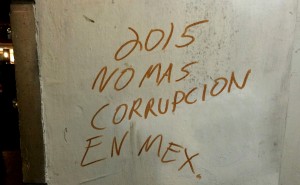Corruption, A Citizen’s Crisis

“Corruption can be beaten if we work together. To stamp out the abuse of power, bribery and shed light on secret deals, citizens must together tell their governments they have had enough.” —José Ugaz
By Codi Peterson, Marketing —
It is time for the citizens of the world to stand up to their leaders in order to fight the corruption that remains rampant throughout governments. Our governments are meant to serve us, not the other way around. To assist in the battle, Transparency International creates an annual Corruption Perceptions Index (CPI). This index determines the level of corruption in 168 countries by analyzing twelve different data sources from eleven different institutions for the year 2015. The CPI should assist us in determining how we can decrease corruption and if our efforts are successful.
The Corruption in Mexico
The CPI is lending its statistics to uncover corruption in many countries, specifically Mexico. However, despite increased measures by the Mexican government over past years, Mexico’s rating on the CPI has seen little improvement. In 2011, Mexico received a rating of 34/100 (100 meaning clean of corruption) and ranked 69th most corrupt country in the world. Then last year, Mexico’s rating inched up to thirty-five on the CPI and placed it as the 73rd most corrupt country in the world. The change in ranking is due more to the increase in corruption in other countries rather than a decrease of corruption in Mexico. Other countries such as Australia, Turkey, and Spain have seen significant decreases in their ratings over the past four years. Over two-thirds (112 out of 168) of the countries received a rating of less than fifty, signifying a substantial problem with corruption.
The Mexican government has taken the initiative to eliminate corruption within its country. Just recently Enrique Peña Nieto, the president of Mexico, was accused of conflict-of-interest and corruption scandals, so he appointed Virgilio Andrade to investigate. After a “thorough” investigation it was determined that the president had not done anything unlawful. President Nieto was willing to subject himself to an investigation in the name of fighting corruption but he appointed a close friend to conduct the investigation. There is a huge conflict of interest in such investigations when corruption is being covered up.
“Corruption Can Be Beaten”
We cannot expect governments to filter out the corruption that is committed within them. We have a very weak system of accountability for our governments, and as such we create a higher amount of perceived opportunity. We must strengthen that system of accountability for two reasons. First, accountability filters out corrupt government officials. Second, by increasing regulation of government official activities, we decrease the window of opportunity for corruption to occur. José Ugaz, chairman of Transparency International, said, “Corruption can be beaten if we work together. To stamp out the abuse of power, bribery and shed light on secret deals, citizens must together tell their governments they have had enough.”
There are many ways that we can hold our public servants accountable. With the increase in accuracy of lie detection technology like EyeDetect, lie detection tests are extremely reliable—accurate up to 85%. Converus is able to design specific tests that would allow us to know specifically what ways corruption has taken place. EyeDetect can help determine if government officials have ever lied about accepting bribes and utilizing entrusted information to make a profit, or if they have ever used their position of power in any other unlawful ways.
As citizens, we could pre-screen our candidates before we decide who to elect. We could also require biannual tests while they are in office. If it discovered that they have in fact been involved in corruption, it would prompt an investigation that we could require. As we come together to make our governments accountable, we can save the trillions of dollars that are lost each year; we can prevent the misuse of power and remind our governments who serves whom.
Source
Photo courtesy of Cat Branchman. (Creative alterations made)

